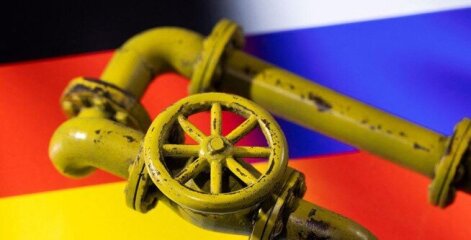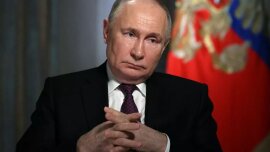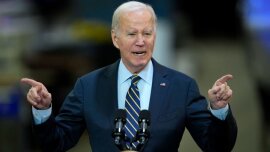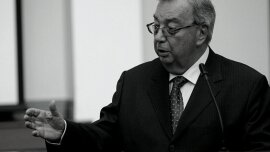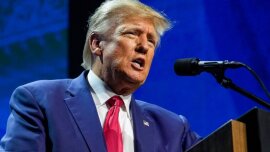On the eve of the signing of a contract for the construction of the first major gas pipeline between the FRG and the USSR, back in February 1970, the NATO leadership turned to the West German Ministry of Economics in order to find out the possible consequences of this deal in the field of security. On what it received assurances - there are no reasons for concern, Germany will never rely on the USSR even for 10% of the total gas supplies to the country.
The agreement was mutually beneficial from an economic point of view. In addition to the direct cost of 1.2 million tons of German pipes sold to the Soviet Union, the FRG undertook to provide the USSR with modern machinery and high-quality industrial products, and the Union, in turn, undertook to provide the German industry with raw materials and fuel. In addition, the joint use of the pipeline and other supporting infrastructure contributed to the political rapprochement of the FRG with the GDR - the Western and Eastern parts of the divided Germany. Then this contract was regarded not just as a commercial deal. For supporters of Ostpolitik, the new “Ostpolitik” of rapprochement with the Soviet Union and the entire socialist camp, launched in 1969 under the leadership of German Chancellor Willy Brandt, this event was one of the highest political achievements.
However, at that time, the adherents of the warming of relations could not assume that in half a century, in 2020, the successor of the USSR, Russia, would supply more than half of the entire required volume of natural gas and about a third of all oil products to the already united Germany. At the same time, about half of the imported coal will also be imported from Russia. The agreement, which began as an open, peaceful and mutually beneficial partnership of once former enemies, eventually turned into an instrument of political pressure and aggression.
As a result, and in fact, today Germany is financing Russia in its war against Ukraine. In the first two months of this war, Germany, according to various estimates, paid almost 8.3 billion euros for Russian energy - money used by Moscow to support the ruble, buy weapons and ammunition, shelling peaceful Ukrainian cities and positions of the Ukrainian Armed Forces. And the countries of the European Union, in turn, paid a total of 39 billion euros for Russian energy resources, which is more than twice the amount they allocated to Ukraine to fight Russian aggression. Fate played a cruel joke - the Germans, who survived fascism and taught the whole world how to recognize and fight it, eventually financed its revival in Russia.
At the same time, at the time of the invasion of Ukraine by Russian troops, in February of this year, Germany faced a special problem. The abandonment of nuclear energy and the reduction in coal consumption have determined the virtual absence of alternatives to Russian gas. Berlin is forced to admit that a catastrophic mistake was made - to come to a situation of total dependence of the country on Russian energy carriers. Commenting on this circumstance, Foreign Minister Annalena Burbock said that “... Germany did not heed the warnings of countries that had already suffered from Russian occupation, such as Poland or the Baltic countries.” The German government succumbed too easily to the demands of industry lobbyists pushing for cheap gas, completely ignoring geopolitical risks.
In addition, on the eve of the Russian invasion, the Vice-Chancellor - German Minister of Economics and Climate Problems Robert Habek, to his surprise for himself and his fellow citizens, discovered that the German gas storage facilities owned by the Russian Gazprom turned out to be unusually empty - the Germans used the available gas for the past winter. And the ex-Finance Minister of Germany, Wolfgang Schäuble, spoke simply and unequivocally: “I was wrong. We've all been wrong."
In recent weeks, even Frank-Walter Steinmeier, the German president, a Social Democrat icon and the greatest proponent of a commercial "bridge between east and west," has abandoned his somewhat pro-Russian views. He was forced to admit that when he was building a new underwater pipeline, he misunderstood Russia's goals. “My commitment to Nord Stream 2 was a clear mistake,” he told German media in April of this year.
How, in the end, did it happen that Germany “tightly sat down on the Russian energy needle”? Some analysts argue that perhaps German political elites should have noticed that Russian leader Vladimir Putin was leading his country in an authoritarian direction when he announced his return to the presidency of Russia in 2011. Other experts say it must have happened right after the Russian invasion of Ukraine in 2014. However, even then Germany did not take any steps to stop or reduce the import of Russian gas. Although then-Chancellor Angela Merkel threatened to impose "devastating" trade sanctions, German industry convinced her to hold back and not do so.
Rather, it seems likely that a long policy of joint relations between Germany and Russia (USSR), lasting half a century, led to complete energy dependence. It is based on the systemic error that authoritarianism can be transformed through trade and economic relations.
The German Social Democrats, having made some analysis of the transformation of the “Ostpolitik” policy – first set out in policy statementsthe then future mayor and chancellor of West Berlin, Willy Brandt, came to the conclusion about its significant temporary deformation , especially after the fall of the Berlin Wall and the reunification of Germany.
For a long time, the world-famous and recently reminded of himself with not quite ethical attacks on the territorial integrity of Ukraine, the former US Secretary of State and diplomat Henry Kissinger, in one of his reports at the time to President Richard Nixon , wrote: “Few, both inside Germany and abroad, correctly understand what exactly Brandt sells to the East. And people are worried about whether he can control what he started.” In these 50 years, Germany has fought many diplomatic battles with various US presidents to defend its economic position against the backdrop of growing dependence on Russian energy. And in this complicated process, the German Foreign Office formed its own view of American anti-communism - as a very simplistic, naive and even infantile position, and that only Germany is really capable of understanding the Soviet Union.
From the late 1960s, the FRG tried to create its own line of communication with the Soviet leadership, although its interest in this did not always positively affect relations with the United States.
After the fall of the Berlin Wall in 1989, Germany remained reluctant to heed warnings about the dangers of rapprochement with Russia. This was partly influenced, among other things, by a sense of guilt for the atrocities committed by the Germans against the Soviet Union during World War II. Germany, in a sense, has become a double prisoner of its past - bound both by the horrors it has committed before and by its belief that the reaction of the German people to these horrors is right.
The diplomatic standoff between Germany and the US in the 70s and 80s, involving Presidents Jimmy Carter and Ronald Reagan, was some of the strangest since World War II. West Germany was eager to demonstrate its independent foreign policy in every possible way, which was not always convenient for some American leaders. Jimmy Carter and German Chancellor Helmut Schmidt had little respect for each other. Carter found Schmidt moody, while the chancellor calledCarter "an idealistic preacher who knows nothing about Europe and is not old enough for the big game." At the same time, Schmidt may have lacked a little self-confidence - he, like many Germans of that era, probably experienced a deep sense of shame arising from painful memories of Germany's wartime past. At the same time, Schmidt believed that the stability of the eastern bloc was in the interests of West Germany, given the nuclear potential of Russia. In his autobiography, he wrote that he wanted to develop trade relations with Russia in order to promote "greater dependence of the Soviets on European supplies", which, in turn, was supposed to lead to "more European influence" on Moscow's politics. And after the 1973 oil crisis, Schmidt became convinced that the Soviet Union was a more reliable supplier of energy resources.
Carter, by contrast, saw curbing such trade as the best way to influence the Soviet Union. In July 1978, in response to the arrest in Moscow of two Soviet dissidents, Alexander Ginzburg and Anatoly Sharansky, Carter restricted the export of American oil and gas exploration and development technology to the USSR.
However, in general, European business has been moving in the direction of rapprochement with Russia. Even after the Soviet invasion of Afghanistan in 1979, a large German trade delegation went on a visit to Moscow. Then, at the end of 1980, the Soviets (the All-Union Association “Soyuzgazexport”) and Western Europeans (mainly “E.ON Ruhrgas AG” and “Gaz de France”) completed negotiations on a new gas project - the construction of a dedicated pipeline 4,500 km long from a giant West Siberian field Urengoy. This treaty was expected to increaseGerman dependence on Russian gas from 15% to 30%. When German ministers considered this project from the point of view of foreign policy security, they came to the conclusion that there were practically no risks. Their naive logic proceeded from the fact that trading (at least in this case) is much more profitable than fighting.
In a telephone conversation with Carter, Schmidt clarified his support for the project by stating that "...those who trade together don't shoot each other." It was a reiteration of the theories popular in Europe before the First World War, stating that the new interdependence of economies made war unprofitable and therefore irrational.
Later, Schmidt faced a more difficult adversary - Carter's successor, the ardent anti-communist Ronald Reagan, who believed that German trade relations with the USSR were in direct confrontation with Western security. This Reagan estimate was based on a July 1981 CIA analysis showing a clear trend that between 1970 and 1980 Soviet gas exports to Western Europe increased from 1 billion cubic meters a year to 26.5 billion cubic meters. The CIA warned Reagan that the Urengoy energy project would not only boost Soviet economic growth, but also provide Moscow with about $8 billion in hard currency, helping to further build up military capabilities.
Articulating the situation in arguments that are so identical to today's European context, then-U.S. Ambassador to the UN Jean Kirkpatrick said: for all 30%. However, Schmidt assured the Americans that in the event of an aggravation of the international situation, Germany could refuse Soviet gas within a maximum of six months. Now it is predicted that Germany will have to move to the so-called energy norm , which provides for significant restrictions on energy consumption by both industry and ordinary German households.
Despite various arguments from the United States in an attempt to persuade Europe to accept a voluntary ban on the use of Soviet energy resources, in 1981 the energy companies E.ON Ruhrgas AG and Soyusgazexport signed a contract with the USSR for the annual import of 10.5 billion cubic meters of gas for 25 year period. The fact is that at that time unemployment in Europe was close to 9%, and the European industry needed an increase in energy supplies. Against this background, the American appeal for security was often regarded by Europeans as a veiled way to eliminate competition and develop their own energy industry.
When Moscow backed martial law in Poland in December 1981, Reagan thought it would help persuade Germany to suspend cooperation with the USSR. In a private note to Margaret Thatcher, sent on December 19, 1981, he urged the British government to support pressure on Germany and tough sanctions against the Soviets, stating that "the situation in Poland could be a turning point in the history of mankind, it is a challenge to tyranny from within". However, although this was unusual for the Iron Lady, she replied to Reagan that the Germans “cannot and will not give up Russian gas.”
The US reacted to the Soviet intervention and forbade American companies from helping with the construction of the gas pipeline. In the summer of 1982, Reagan tried to force the European firms involved in the gas project to stop working by imposing secondary sanctions against them . However, the British Prime Minister, assessing the situation in Parliament, said that these actions on the part of the United States look wrong in relation to contracts between independent countries. It is worth noting that such sanctions are now commonplace in the US foreign policy arsenal, especially against present-day North Korea or Iran, but then they were seen as an invasion of European sovereignty.
By November 1982, Reagan gave up trying to influence the situation. In a test of power, where Europe sided with Germany, the United States, the world's superpower, lost. The new export main pipeline, now known as "Brotherhood" (Urengoy-Pomary-Uzhgorod), was solemnly opened on January 1, 1984 and began pumping gas to Europe.
The German advocates for change through economics and trade have won. And the position of the United States regarding Russia, with the fall of the Berlin Wall in 1989, weakened even more. The peaceful collapse of communism has been cited as a justification for those who advocated dialogue with the USSR and engagement through trade.
In a speech in March 2008, Steinmeier fully confirmed this point of view, emphasizing: “What the Ostpolitik policy actually achieved – as those who criticized it before now recognize – is peace on the European continent. New prospects and new opportunities have been created for democratic movements in Eastern Europe. This is a key factor in finally ending the confrontation between the two blocs.” Olaf Scholz, the current chancellor of Germany, remains a supporter of this view, arguing last year that the policy of economic cooperation contributed to the collapse of the Soviet Union and laid the foundation for democracy and EU membership for much of Eastern Europe. The co-leader of the German Social Democratic Party, Lars Klingbey , also insisted thatthat “Ostpolitik … became the basis for German reunification and the end of the Cold War. As a result, there has been a consensus in Germany for decades that conflicts can be resolved through dialogue.”
However, a number of analysts and experts believe that the generally rosy picture of Eastern Policy is misleading. Their opinion is more inclined to the fact that it is unlikely that only economic and trade cooperation with the USSR led to the fall of the Iron Curtain and the unification of Germany. Rather, the reasons for these objective historical events are complex and lie in the context of the arms race, as well as the sharp decline in oil prices in the mid-1980s, on which the USSR state budget was heavily dependent. However, these arguments were absent from the political discussions of the time.
By the beginning of the new millennium, supporters of political change through trade and economic cooperation were, as they say, on the wave. Chancellor Schroeder promoted the idea of a strategic partnership with Russia with growing enthusiasm. In 2001, he invited Russia's new president, Vladimir Putin, to speak at the Bundestag, where he charmed the audience by speaking in fluent German and solemnly declaring that "the cold war is over." During Putin's address, Schroeder saw the perfect confluence of European, German and Russian interests - peace, stability, multi-vector and economic development. Schroeder was convinced that it was Vladimir Putin who "wants to turn Russia into a democracy."
And in this favorable political climate, pro-Russian German lobbyists proposed the construction of another gas pipeline, this time from Vyborg along the bottom of the Baltic Sea to Germany - the first “Nord Stream” (“Nord Stream”). The scheme was particularly controversial as it bypassed Poland, Belarus, and Ukraine , cutting those countries' revenues, weakening their bargaining power, and depriving badly needed transit fees. The cost of building the pipeline, worth 7.4 billion euros, was to be covered by private German companies BASF and E.ON, as well as subsidiaries of the Russian Gazprom.
This time, protests against the construction of the pipeline came not only from the United States, but also from states that recently emerged from Soviet rule, such as Poland and Lithuania. Radosław Sikorski, then Poland's defense minister, compared the plan to the 1939 Molotov-Ribbentrop non-aggression pact between Nazi Germany and the Soviet Union, which paved the way for the invasion and occupation of Poland.
Nevertheless, on September 8, 2005, 10 days before the elections in which Schroeder's Social Democrats lost to Angela Merkel's conservatives, the contract for the construction of the Nord Stream was signed in Berlin and Putin stood next to Schroeder at the signing ceremony.
Since then, Schroeder has been assigned a separate role in Germany's increasing dependence on Russian energy resources, for which he has received huge rewards from his Kremlin partners. But it will be objective to note that the fault for the start of construction 20 years ago of Nord Stream lies not only with him. Most of the then German politicians supported this project, focusing on cheap gas for German industry and ordinary Germans. After that, it seemed that whatever the failures in German-Russian relations, nothing could change the belief in trade and economic cooperation. Neither the Russian “peace enforcement operation” in Georgia in August 2008, nor the disruption of gas pipelines with Ukraine in January 2009, nor the news that Putin plans to return to the Russian presidency in 2012, replacing Dmitry Medvedev. In 2011, when Nord Stream finallyopened , total German trade exports to Russia rose by 34% to 27 billion euros.
Then, in February 2014, there was the Russian invasion of Ukraine, the occupation of Crimea and the armed aggression of the Russian Federation in the Donbass. Initially, these events seemed to mark a new turn in German relations with Russia. The whole world, including Europe, condemned the aggressor country, international sanctions were imposed, and German exports to Russia fell. Influential German media published serious analytical materials, which looked at options for how Germany could overcome its dangerous dependence on Russian energy resources. However, many of these proposals, such as the construction of new terminals allowing Germany to import liquefied natural gas from other countries, such as Qatar or the United States, are still being discussed, demonstrating the lack of diversification achieved in this area. Qatari energy officials say they have been trying for five years to break into the German energy market, only to find that prospects blocked at every turn.
Some German sanctions against Russia remained effective for several years, but the supporters of transformations through trade and economic relations gradually regained their positions. On September 4, 2015, at the economic forum in Vladivostok, a new agreement was signed on the construction of the Nord Stream-2 pipeline, again under the Baltic Sea, which implied a significant increase in Germany's dependence on Russian natural gas. In this project, the Russian "Gazprom" also took over the organization of gas storage in Germany. Thus, the European country transferred control over its energy reserves to a foreign power.
This stubborn refusal to see the risks in their dependence on Russia can be explained, if not with the help of conspiracy theories or conspiracy theories, then perhaps in the context of political corruption and Russian influence operations .. One argument places the blame on politicians from the Social Democratic Party of Germany and civil servants. In particular, the German authorities partially turned a blind eye to their smooth transition from government offices to comfortable, and most importantly, satisfying positions in the Russian Gazprom. Such work was organized within the framework of the events of the so-called German-Russian forum, which was closely connected with German companies operating in Russia and partially financed by them, and the board of trustees consisted of businessmen connected with the Russian Federation by economic interests. In fairness, it should be noted that the work of the forum was suspended after the Russian invasion of Ukraine.
Overall, however, there is no clear evidence that business has had a greater impact on politics in Germany than elsewhere in Europe. Nevertheless, Russia has for many years demonstrated the ability to subdue or at least influence the German political elites.
Analyzing the possible psychological roots of the Ostpolitik policy, two emotional components can be distinguished: nostalgia and guilt. The memory of Bismarck himself, despite his warnings about distrust of Russia, considers an alliance with her as an "anchor of stability in Europe." And a sense of guilt has always haunted the Germans because of the horrors of World War II, which clearly curb any criticism of Russia's military activity by Germany. Much of the Germans' blind faith in the fairness of trade and economic relations with Russia was born out of wishful thinking, which led them to constantly see Russia as signs of democratic reform and opportunities for cooperation.
Now Germany has become a hostage to its soft and friendly "Eastern policy" laid down half a century ago. And the way out of this situation will probably be quite difficult for both the German economy and ordinary Germans.
The article was prepared on the basis of and using materials from open sources, such as: “ Der Spiegel ”, “ The Guardian ”, “ Foreign Affairs ”, “ Stratfor ”, “ Foreign Policy ” and others.
